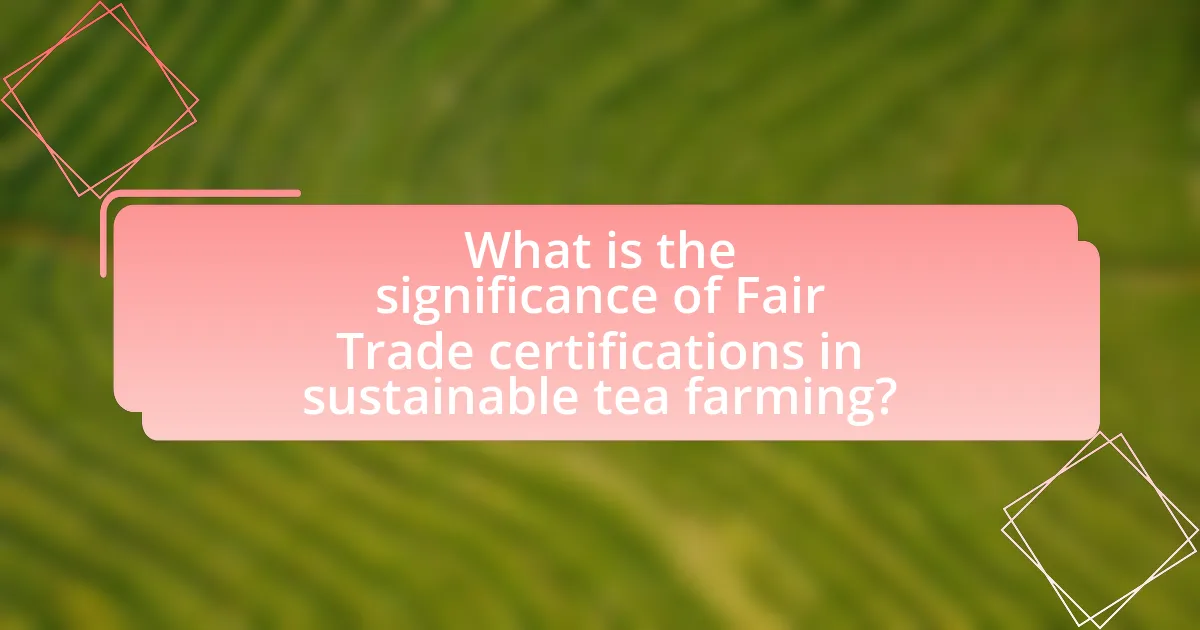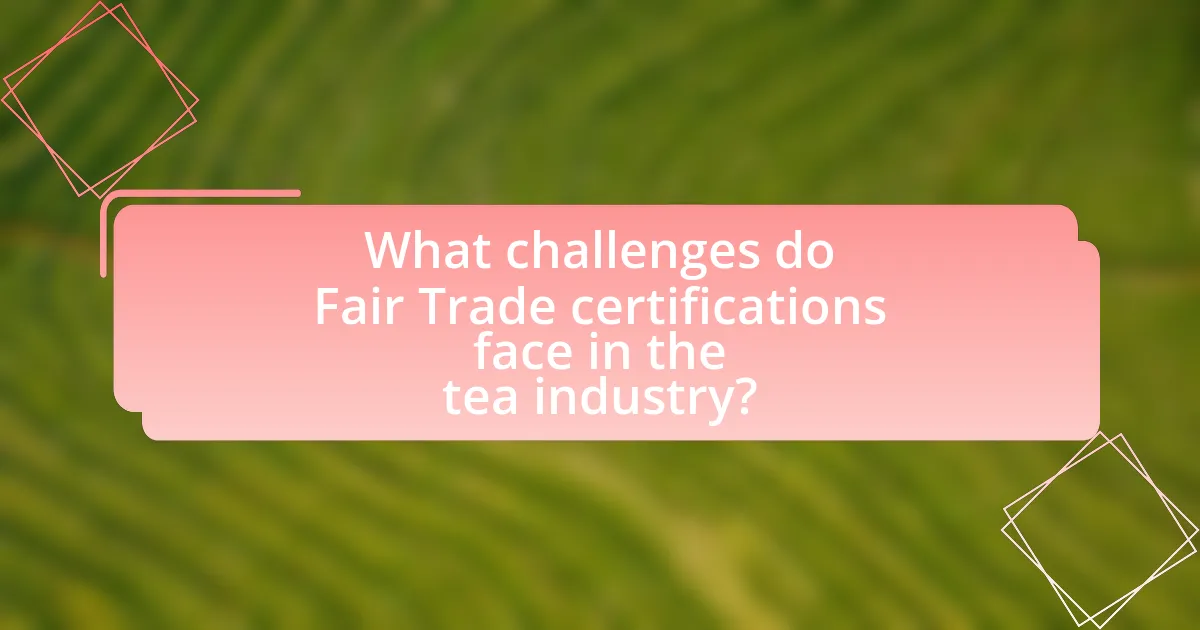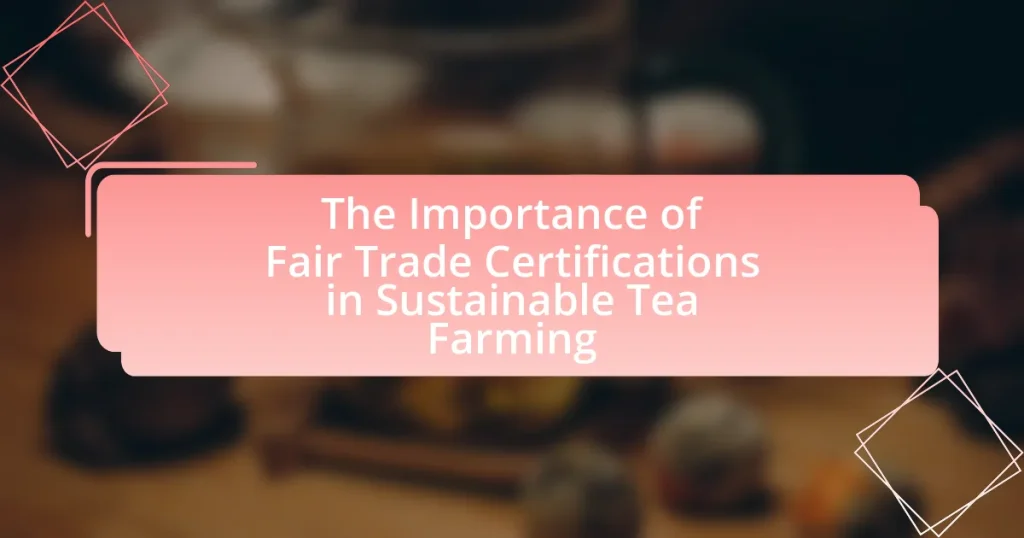Fair Trade certifications play a crucial role in sustainable tea farming by ensuring fair wages, safe working conditions, and environmentally friendly practices for farmers. These certifications mandate adherence to specific standards that promote social equity and community development, allowing producers to earn higher incomes and invest in local initiatives. The article explores the significant impacts of Fair Trade on tea farmers, including income stability, environmental sustainability, and community empowerment, while also addressing the challenges faced in the industry and the future prospects for Fair Trade certifications. Additionally, it highlights the ethical considerations for consumers and the innovations emerging within the Fair Trade tea sector.

What is the significance of Fair Trade certifications in sustainable tea farming?
Fair Trade certifications are significant in sustainable tea farming as they ensure fair wages and safe working conditions for farmers, promoting social equity and environmental sustainability. These certifications require adherence to specific standards that support eco-friendly farming practices, such as reduced pesticide use and soil conservation. For instance, Fair Trade certified tea producers often receive a premium price for their products, which can be reinvested into community development projects, enhancing local infrastructure and education. This model not only improves the livelihoods of farmers but also encourages sustainable agricultural practices that protect biodiversity and reduce environmental impact.
How do Fair Trade certifications impact tea farmers?
Fair Trade certifications positively impact tea farmers by ensuring they receive fair prices for their products, which enhances their economic stability. These certifications mandate a minimum price that covers the cost of sustainable production, allowing farmers to invest in their communities and improve their livelihoods. For instance, a study by the Fair Trade Foundation found that certified tea farmers earn up to 30% more than their non-certified counterparts, enabling them to afford better healthcare and education for their families. Additionally, Fair Trade practices promote environmentally sustainable farming methods, further benefiting the farmers and their ecosystems.
What are the specific benefits of Fair Trade for tea producers?
Fair Trade provides several specific benefits for tea producers, including guaranteed minimum prices, access to premium markets, and support for community development. These benefits ensure that tea producers receive fair compensation for their labor, which can be significantly higher than conventional market prices. For instance, Fair Trade standards often require a minimum price that covers the cost of sustainable production, which helps protect producers from volatile market fluctuations. Additionally, Fair Trade certification opens up access to international markets that prioritize ethical sourcing, allowing producers to sell their tea at higher prices. Furthermore, a portion of Fair Trade premiums is invested back into local communities, funding projects such as education, healthcare, and infrastructure improvements, thereby enhancing the overall quality of life for tea producers and their families.
How do Fair Trade certifications influence farmers’ income stability?
Fair Trade certifications significantly enhance farmers’ income stability by guaranteeing minimum price levels and providing access to premium markets. These certifications ensure that farmers receive a fair price for their products, which is often higher than conventional market prices, thus reducing income volatility. For instance, a study by the Fair Trade Foundation indicated that certified farmers can earn up to 30% more than their non-certified counterparts, leading to improved financial security and the ability to invest in their farms and communities. Additionally, Fair Trade practices promote long-term trading relationships, which further stabilize income by reducing the risks associated with market fluctuations.
Why is Fair Trade important for consumers?
Fair Trade is important for consumers because it ensures that the products they purchase are ethically sourced, promoting fair wages and working conditions for producers. By choosing Fair Trade certified products, consumers support sustainable farming practices that protect the environment and contribute to community development. For instance, Fair Trade standards require that farmers receive a minimum price for their goods, which helps stabilize their income and improve their quality of life. This commitment to ethical sourcing resonates with consumers who prioritize social responsibility and environmental sustainability in their purchasing decisions.
How does Fair Trade certification affect consumer choices?
Fair Trade certification significantly influences consumer choices by increasing the likelihood of purchasing products that are ethically sourced. Consumers often prefer Fair Trade certified products because they align with values of social responsibility and sustainability. Research indicates that 66% of consumers are willing to pay more for products that support fair labor practices and environmental sustainability, demonstrating a clear preference for Fair Trade items. This preference is driven by the perception that Fair Trade certification ensures better wages and working conditions for farmers, which enhances brand loyalty and consumer trust.
What ethical considerations do consumers have regarding Fair Trade tea?
Consumers have several ethical considerations regarding Fair Trade tea, primarily focusing on fair wages, sustainable farming practices, and social equity. Fair Trade certifications ensure that tea producers receive a minimum price that covers their production costs and a premium for community development, which directly addresses the issue of fair wages. Additionally, consumers are concerned about the environmental impact of tea farming; Fair Trade practices promote sustainable agricultural methods that reduce chemical use and protect biodiversity. Social equity is another critical consideration, as Fair Trade initiatives often empower marginalized communities, ensuring that women and smallholder farmers have equal opportunities. These ethical considerations are supported by data indicating that Fair Trade practices can lead to improved living conditions and economic stability for producers, as evidenced by studies from organizations like Fair Trade International.

How do Fair Trade certifications contribute to environmental sustainability in tea farming?
Fair Trade certifications contribute to environmental sustainability in tea farming by promoting eco-friendly agricultural practices and ensuring responsible resource management. These certifications require farmers to adhere to specific environmental standards, such as reducing pesticide use, implementing soil conservation techniques, and protecting biodiversity. For instance, Fair Trade guidelines often encourage organic farming methods, which can lead to healthier ecosystems and reduced chemical runoff. Additionally, Fair Trade practices support the use of sustainable farming techniques that enhance soil health and water conservation, ultimately contributing to the long-term viability of tea farming. Studies have shown that Fair Trade certified farms tend to have better environmental outcomes, including improved soil quality and increased biodiversity, reinforcing the positive impact of these certifications on sustainability in the tea industry.
What practices are encouraged by Fair Trade certifications?
Fair Trade certifications encourage practices that promote equitable trading conditions, sustainable farming, and community development. These practices include paying fair wages to workers, ensuring safe working conditions, and prohibiting child labor. Additionally, Fair Trade promotes environmentally sustainable farming methods, such as organic farming and biodiversity conservation, which help protect ecosystems. According to the Fair Trade International standards, certified producers must also invest in community projects, such as education and healthcare, thereby enhancing the overall quality of life for workers and their families.
How do these practices promote biodiversity in tea cultivation?
Fair Trade practices promote biodiversity in tea cultivation by encouraging sustainable farming methods that protect ecosystems. These practices include organic farming, which avoids synthetic pesticides and fertilizers, thereby preserving soil health and supporting a diverse range of plant and animal species. Additionally, Fair Trade certifications often require farmers to maintain natural habitats and promote agroforestry, which integrates tea plants with other crops and trees, enhancing habitat complexity and biodiversity. Research indicates that farms adhering to Fair Trade standards show higher levels of species richness compared to conventional farms, demonstrating the positive impact of these practices on biodiversity.
What role does Fair Trade play in reducing chemical usage in tea farming?
Fair Trade plays a significant role in reducing chemical usage in tea farming by promoting sustainable agricultural practices among certified producers. Fair Trade standards encourage farmers to adopt organic farming methods, which limit the use of synthetic pesticides and fertilizers. For instance, Fair Trade certification often requires adherence to specific environmental criteria that prioritize ecological balance and biodiversity, leading to a decrease in harmful chemical inputs. Research indicates that Fair Trade tea producers have been able to reduce chemical usage by up to 30% compared to conventional farming methods, demonstrating the effectiveness of these practices in fostering a healthier farming environment.
How does Fair Trade certification support community development?
Fair Trade certification supports community development by ensuring that producers receive fair prices for their goods, which directly contributes to local economic stability. This certification mandates that a portion of the sales revenue is reinvested into community projects such as education, healthcare, and infrastructure. For instance, a study by the Fair Trade Foundation found that Fair Trade certified cooperatives in developing countries have seen a 20% increase in income, allowing them to fund schools and health clinics, thereby improving overall community well-being.
What community projects are funded through Fair Trade premiums?
Fair Trade premiums fund various community projects aimed at improving social, economic, and environmental conditions in producer communities. These projects often include initiatives such as building schools, providing healthcare facilities, enhancing access to clean water, and supporting agricultural training programs. For instance, a study by the Fair Trade Foundation highlighted that 50% of Fair Trade premiums are allocated to education and health services, demonstrating the significant impact these funds have on community development.
How does Fair Trade certification empower women in tea farming communities?
Fair Trade certification empowers women in tea farming communities by ensuring equitable wages, access to resources, and leadership opportunities. This certification mandates that tea producers pay fair prices, which directly increases women’s income and economic independence. For instance, studies show that Fair Trade practices have led to a 20% increase in income for women workers in certified cooperatives. Additionally, Fair Trade initiatives often include training programs that enhance women’s skills in management and decision-making, fostering their participation in leadership roles within their communities. This empowerment not only improves their social status but also contributes to the overall development of their families and communities.

What challenges do Fair Trade certifications face in the tea industry?
Fair Trade certifications in the tea industry face several challenges, including market saturation, compliance costs, and consumer awareness. Market saturation occurs as numerous brands seek certification, leading to competition that can dilute the perceived value of Fair Trade products. Compliance costs are significant, as producers must meet strict standards, which can be financially burdensome, particularly for small-scale farmers. Additionally, consumer awareness remains low, with many buyers unaware of the benefits of Fair Trade, resulting in limited demand for certified products. These challenges hinder the effectiveness of Fair Trade certifications in promoting sustainable practices within the tea industry.
How do market dynamics affect Fair Trade tea producers?
Market dynamics significantly influence Fair Trade tea producers by affecting pricing, demand, and competition. Fluctuations in global tea prices can directly impact the income of Fair Trade producers, as they rely on premium pricing to sustain their livelihoods. For instance, when conventional tea prices drop, consumers may opt for cheaper options, reducing demand for Fair Trade products. Additionally, increased competition from non-Fair Trade producers can pressure Fair Trade tea producers to lower their prices, undermining the financial stability that Fair Trade certifications aim to provide. According to the Fair Trade International report, Fair Trade tea producers often face challenges in maintaining market share when larger, non-certified brands offer lower prices, highlighting the vulnerability of these producers in fluctuating market conditions.
What barriers exist for small-scale farmers in obtaining Fair Trade certification?
Small-scale farmers face several barriers in obtaining Fair Trade certification, including high costs, complex application processes, and lack of access to information. The certification process often requires significant financial investment for fees, training, and compliance with standards, which can be prohibitive for farmers with limited resources. Additionally, the application process can be complicated and time-consuming, requiring documentation and adherence to specific criteria that may be difficult for small-scale operations to meet. Furthermore, many farmers lack access to the necessary information and support systems to navigate the certification process effectively, which can hinder their ability to achieve Fair Trade status.
How does competition from non-certified tea impact Fair Trade producers?
Competition from non-certified tea negatively impacts Fair Trade producers by undermining their pricing and market share. Fair Trade producers typically adhere to higher production standards and pay fair wages, which can result in higher prices for their products. In contrast, non-certified tea often enters the market at lower prices due to reduced production costs and lack of compliance with ethical standards. This price disparity can lead consumers to choose non-certified options, thereby diminishing the sales and profitability of Fair Trade producers. According to a study published in the Journal of Business Ethics, Fair Trade producers face significant challenges in maintaining market presence when competing against cheaper, non-certified alternatives, which can ultimately threaten their sustainability and the livelihoods of the farmers involved.
What are the future prospects for Fair Trade certifications in sustainable tea farming?
The future prospects for Fair Trade certifications in sustainable tea farming are promising, driven by increasing consumer demand for ethically sourced products. As awareness of environmental and social issues grows, more tea producers are likely to seek Fair Trade certification to access premium markets and enhance their brand reputation. According to the Fair Trade International Annual Report 2022, sales of Fair Trade certified products have seen consistent growth, indicating a strong market trend that supports the expansion of such certifications in the tea sector. Additionally, the integration of sustainable practices within Fair Trade standards aligns with global sustainability goals, further encouraging tea farmers to adopt these certifications for long-term viability and market competitiveness.
How can Fair Trade certifications adapt to changing consumer preferences?
Fair Trade certifications can adapt to changing consumer preferences by incorporating more flexible standards that reflect evolving values, such as environmental sustainability and social equity. For instance, as consumers increasingly prioritize eco-friendly practices, Fair Trade organizations can enhance their criteria to include stricter environmental guidelines, thereby appealing to a broader audience. Research indicates that 66% of global consumers are willing to pay more for sustainable brands, highlighting the demand for certifications that align with these values. By actively engaging with consumers through surveys and feedback mechanisms, Fair Trade can continuously refine its standards to meet the expectations of socially conscious buyers, ensuring relevance in a competitive market.
What innovations are emerging in the Fair Trade tea sector?
Innovations emerging in the Fair Trade tea sector include the adoption of blockchain technology for traceability, which enhances transparency in supply chains. This technology allows consumers to verify the origin of their tea and ensures that farmers receive fair compensation. Additionally, there is a growing trend towards agroecological practices that promote biodiversity and soil health, which are supported by Fair Trade certifications. Research indicates that these practices not only improve the quality of tea but also contribute to environmental sustainability. Furthermore, digital platforms are being developed to connect producers directly with consumers, reducing intermediaries and increasing profits for farmers.
What best practices can tea farmers adopt to maximize the benefits of Fair Trade certifications?
Tea farmers can maximize the benefits of Fair Trade certifications by implementing sustainable agricultural practices, ensuring transparency in their operations, and actively engaging with their communities. Sustainable practices, such as organic farming and integrated pest management, enhance product quality and environmental health, which are key criteria for Fair Trade. Transparency in pricing and labor practices builds trust with buyers and consumers, leading to stronger market relationships. Community engagement, including investing in local education and health initiatives, aligns with Fair Trade principles and fosters long-term partnerships. These strategies not only improve the farmers’ livelihoods but also contribute to the overall sustainability of the tea industry.


